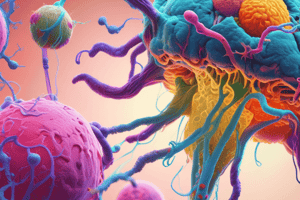Podcast
Questions and Answers
What is the primary function of the lymphatic system?
What is the primary function of the lymphatic system?
- Regulating blood sugar levels
- Synthesizing antibodies
- Transporting fatty acids (correct)
- Producing red blood cells
Which component is part of the innate immunity defense mechanism?
Which component is part of the innate immunity defense mechanism?
- T cells
- Memory cells
- B cells
- Complement proteins (correct)
What is the role of lymph nodes in the immune response?
What is the role of lymph nodes in the immune response?
- Filtering and trapping pathogens (correct)
- Producing white blood cells
- Regulating blood pressure
- Generating custom-tailored reactions
Which immune system arm provides quick, generalized responses without prior exposure to specific pathogens?
Which immune system arm provides quick, generalized responses without prior exposure to specific pathogens?
How do memory cells contribute to the immune system?
How do memory cells contribute to the immune system?
Which function does NOT belong to the lymphatic system?
Which function does NOT belong to the lymphatic system?
What is the primary function of lymph nodes in the lymphatic system?
What is the primary function of lymph nodes in the lymphatic system?
Which lymphoid organ is responsible for producing antibodies and storing platelets?
Which lymphoid organ is responsible for producing antibodies and storing platelets?
How does the lymphatic system help in fat distribution from food digestion?
How does the lymphatic system help in fat distribution from food digestion?
Which activity is NOT beneficial for strengthening the immune system according to the text?
Which activity is NOT beneficial for strengthening the immune system according to the text?
What do macrophages and dendritic cells do after capturing pathogens and damaged cells in the lymphatic system?
What do macrophages and dendritic cells do after capturing pathogens and damaged cells in the lymphatic system?
Why is it important to have proper rest time for immune strength according to the text?
Why is it important to have proper rest time for immune strength according to the text?
Flashcards are hidden until you start studying
Study Notes
Understanding the Immune System and Lymphatics
Your body's intricate defense network, known as your immune system, is essential in safeguarding you against foreign invaders like bacteria, viruses, parasites, and fungi. A vital part of this complex system is the lymphatic system — a network of tissues, vessels, and organs responsible for draining excess fluid from cells, transporting fatty acids, and housing specialized immune cells. Let's explore these interconnected systems and their roles in maintaining our health.
Immune Response
The immune response describes how your body identifies, responds to, and destroys pathogens, both specific to an infection and non-specific to a wide range of threats. There are two primary arms of the immune system, which work together to eliminate infections:
- Innate immunity provides quick, generalized responses without prior exposure to the specific pathogen. Examples include skin barriers, mucus membranes, complement proteins, and natural killer cells.
- Adaptive immunity generates custom-tailored reactions through antigen recognition by B cells and T cells after exposure to a pathogen. This process involves memory cell formation so the immune system can more effectively combat future incursions by the same threat.
Lymph Nodes
Lymph nodes—small bean-shaped structures scattered throughout your body—are critical components of the adaptive immune response. As part of the lymphatic system, they act as filters capturing pathogens, damaged cells, and debris circulating within the lymphatic fluids. Once captured, these particles activate immune cells called macrophages and dendritic cells to engulf them, generating an immune reaction that targets infected sites.
Lymphatic System Function
The lymphatic system serves several crucial functions beyond simply filtering the lymphatic fluid:
-
Drainage: It removes waste products and excess fluid by collecting lymph from tissue spaces and returning it back into blood circulation via large veins near the heart.
-
Absorption: Nutrients absorbed in the small intestine move through the wall of the gut to join the lymphatic system before entering the bloodstream.
-
Fat distribution: Movement of fats and lipids from food digestion to storage areas.
Lymphoid Organs
Lymphoid organs such as spleen, thymus, tonsils, bone marrow, and appendix house maturing white blood cells and control immune processes. These organs interact with immune cells and help coordinate their actions when responding to potential threats. For example, the spleen produces antibodies, filters unnecessary red blood cells, stores platelets, and helps remove old or damaged red and white blood cells.
Immune System Defenses
Maintaining a healthy lifestyle offers various benefits to strengthening your immune system, including:
- Regular exercise: Boosts overall physical fitness levels and enhances immune functioning.
- Sleep: Improves immune performance, ensuring proper rest time supports immune strength.
- Dietary habits: Consuming nutrient-dense foods and staying hydrated promotes optimal immune function.
- Stress management: Chronic stress weakens the immune system, while finding ways to manage stress can improve immune resilience.
In summary, the immune system and lymphatic system form a powerful alliance working tirelessly to protect us from harm. Despite its complexity, understanding these systems better enables us to enhance our immune defenses, maintain good health, and prevent diseases.
Studying That Suits You
Use AI to generate personalized quizzes and flashcards to suit your learning preferences.




